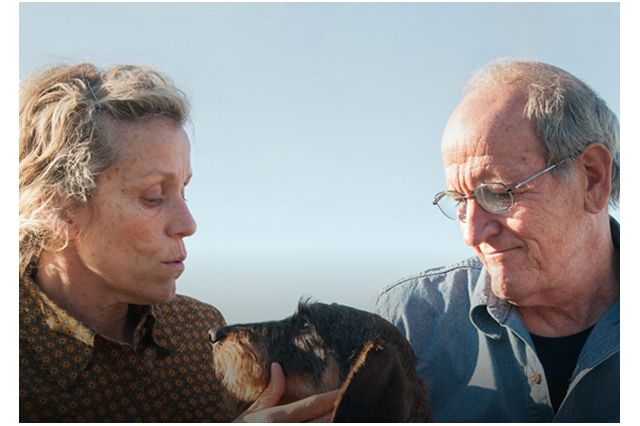 Frances McDormand is an inveterate reader. So when a friend handed her a copy of Elizabeth Strout’s “Olive Kitteridge” about six years ago, she devoured it.
Frances McDormand is an inveterate reader. So when a friend handed her a copy of Elizabeth Strout’s “Olive Kitteridge” about six years ago, she devoured it.
“Loved it,” she said. But even as she passed it around to friends to read, she insisted she had no intention of playing the role — a prickly, mean-tempered math teacher on the windswept coast of Maine, whose life does not go perfectly.
“I don’t read novels looking for material to make into movies, and that certainly was not a novel that needed to be made into a movie,” she told reporters at the TV Critics press tour this summer. Besides, she added, “a 90 minute time frame is not long enough to tell a good female story.”
An actress to whom she had lent the book called her and saw through her, saying, “You want to play that part.”
And McDormand again said no. But, she added, it “got me thinking.” By then she was in her 50s and “wanted to start generating my own work. I wanted to see what that was like. So I optioned it — the week before the week it was nominated for a Pulitzer.”
Good timing.
“Ms. Strout graciously remembered that after she won the Pulitzer for the novel and accepted my offer,” McDormand said. “So I had the option and then went about starting to meet writers.”
She had in mind long-format television, which she says had “become so great for female storytelling and for female performers and directors and writers.” And so she assembled her team: Jane Anderson (“Normal”) doing a deft collection of many of the stories in the book, director Lisa Cholodenko (“The Kids are All Right,” “Laurel Canyon’). And a cast that includes Richard Jenkins and, well into the miniseries, Bill Murray.
They combine for a rich, deeply-felt masterwork so rare for television, that begins its two night run tonight on HBO.
In the series of short stories that make up Strout’s book, Kitteridge is not always the main character; sometimes she’s barely mentioned. But through the series of stories, she emerges as a character through whom the seemingly normal affairs of a town life: deaths, romance, depression, shocking crime, grief, abandonment all occur.
“What’s really also really interesting technically about what Strout did was that she called the novel ‘Olive Kitteridge.’ It’s 13 short stories. Olive Kitteridge isn’t even in most of them,” McDormand said. “She’s peripheral in some of them. In fact, the first short story, it’s called “Pharmacy.” It’s what we based our first hour of the film on. It’s about Henry. And Olive is his wife and the mother of his son.”
“My job was to take Olive and follow her through the stages of her life,” says Anderson, the screenwriter. “You’ll recognize your parents or your grandparents, because they are of a generation where you fall in love and you make it work. And even if your heart goes to someone else, you make it work. And Olive is that horrible math teacher you had in school. She’s the neighbor who was cranky and wouldn’t talk to you over the fence. She’s the lady on the street who has that look on her face, but she’s infinitely decent and brave and noble, and that’s what’s so brilliant about the character that Elizabeth Strout created.”
McDormand said, “part of what our story is about is a woman who, under a lot of circumstances, would never is invisible, but she makes sure she’s not.”
“Olive Kitteridge” was not shot in Maine, but in Gloucester, Mass., for tax purposes, but also because it resembled fictional coastal town Strout had created in Crosby.
“The most important thing was it wasn’t quaint Maine,” McDormand said. I”t was a working Maine. It was a working class Maine. It was a real it was an industrial a town that had an industrial past, because what you see in the 30 years that we we span 25 years we span is that it really changes from small, you know, privately owned businesses to corporately owned businesses.”
There are touches of previous HBO castings here and there, from Jenkins, who was the father on “Six Feet Under” to John Gallagher Jr., who returns to the network next week for the final season of “The Newsroom.”
“This could be one of the bravest things that HBO has allowed a team of artists to do, because it is so quiet and so deceptively ordinary and so infinitely impossible to pitch,” Anderson says. “And it’s not even chick filmmaking. It’s humanity filmmaking.”
McDormand said she got Murray, who appears largely in the final episode Monday, because they had worked so well together as a couple in Wes Anderson’s “Moonrise Kingdom.” “I knew that all I had to say was, ‘There’s more of that in this.’”
“He has just this innate ability to move between drama, sadness, and this comedic brilliance, and it’s on razor’s edge, and he just does it so masterfully,” the director Cholodenko said of Murray, “It was astonishing to direct him and witness it up close and personal, but I think it just translates beautifully in the film.”
Some stories from the novel had to be left out (though there are flashes of some of its characters, such as the piano bar performer Angela O’Meara, portrayed by singer Martha Wainwright).
“We’ve got a few more stories to tell,” McDormand said. “So we’ll see what happens. Maybe we can do them on YouTube.”